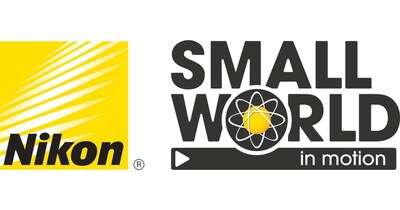15th Annual Nikon Small World in Motion Competition Winner Magnifies Self-Pollination Process in a Common Wildflower
Time-lapse video of a thymeleaf speedwell reveals the reproductive strategy select plants may adopt when pollinators are scarce
MELVILLE, N.Y., Sept. 24, 2025 /PRNewswire/ -- Nikon Instruments Inc. today unveiled the winners of its 15th annual Nikon Small World in Motion Video Competition, an integral component of the Nikon Small World competition and a showcase of the world's most dynamic microscopic imagery. The first-place prize was awarded to retired engineer-turned-microscopist Jay McClellan for his striking video capturing the self-pollination of a thymeleaf speedwell (Veronica serpyllifolia). The process demonstrates the resilience found in nature, revealing one of the hidden strategies select species of plants use to adapt and survive.
McClellan's work fuses decades of experience in industrial machine vision system development with a passion for microscopy and photography, resulting in videos that are both mesmerizing and informative. His winning video captures a tiny blue blossom opening to the morning sun, its stamens elongating until one curls toward the pistil, dusting the stigma with pollen and completing self-pollination. "This isn't some exotic plant you'd need to travel the world to find. It's a common 'weed' that might be growing right under your feet," said McClellan. "I love the idea that anyone could discover beauty like this if they just looked closely."
Thymeleaf speedwells bloom quickly and unpredictably, meaning filming such a fleeting biological process required a perfect storm of preparation, timing, and technique. To capture the video, McClellan had to anticipate movements and program a custom motion-control system to keep the reproductive structures perfectly in frame. He also employed advanced focus-stacking techniques to maintain crystal clarity across focal planes, a challenge that led him to develop his own hardware and software for microscopic video. "I may capture many terabytes of raw footage for a single shot," he explained. "Running the focus-stacking overnight is like waiting for Christmas morning — you never know whether you'll get a disappointment or something amazing."
McClellan emphasized the honor he feels to be among the many talented individuals who have participated in Nikon Small World for over five decades, and the importance of bringing the microscopic world to light: "The best part for me is not winning a prize but getting the opportunity to share my work with the world and let people see microscopic wonders in a new way."
McClellan also earned an honorable mention in this year's Small World in Motion competition for his video of the dissolution and crystallization of cobalt, copper, and sodium chlorides. He has now placed four total videos in the competition since 2023, including his movie of water droplets evaporating from the wing scales of a peacock butterfly, for which he earned second place in the 2024 Small World in Motion competition.
"As we celebrate the 15th anniversary of the Small World in Motion competition, this year's winners showcase the extraordinary choreography of life unfolding at a scale beyond ordinary sight," said Eric Flem, Senior Manager, Communications and CRM at Nikon Instruments. "Jay McClellan and all our other winners' videos reflect the competition's enduring purpose to inspire wonder, fuel discovery, and showcase the artistry inherent in scientific exploration."
Outside of Nikon Small World, McClellan is currently working on a nature documentary featuring tiny creatures, using a portable version of his video rig to take his imaging techniques into the field.
Second place was awarded to Benedikt Pleyer for his video of volvox algae swimming in a water drop that had been pipetted into the central opening of a Japanese 50 Yen Coin.
Third place was awarded to Dr. Eric Vitriol for his video of actin and mitochondria in mouse brain tumor cells.
The 2025 judging panel included:
- Deboki Chakravarti, PhD, Science Communicator, Host and Creator of "Journey to the Microcosmos," "Tiny Matters," "Scishow Tangents," and "Crash Course Organic Chemistry."
- Jeff DelViscio, Chief Multimedia Editor and Executive Producer at Scientific American
- Andrew Moore, PhD, Postdoctoral Scientist in the Lippincott-Schwartz Lab at the Howard Hughes Medical Institute's Janelia Research Campus
- Liz Roth-Johnson, PhD, Curator of Life Sciences at the California Science Center
- W. Gregory Sawyer, PhD, Chief BioEngineering Officer and Chair of the Department of BioEngineering at the Moffitt Cancer Center
For additional information, please visit www.nikonsmallworld.com, or follow the conversation on Facebook, Twitter @NikonSmallWorld and Instagram @NikonSmallWorld, and LinkedIn.
NIKON SMALL WORLD IN MOTION WINNERS
1st Place
Jay McClellan
Saranac, Michigan, USA
Self-pollination in a flower of thymeleaf speedwell (Veronica serpyllifolia)
Time lapse, Image Stacking
5X (Objective Lens Magnification)
2nd Place
Benedikt Pleyer
Kirchberg, Bavaria, Germany
Volvox algae swimming in water drop that has been pipetted into the central opening of a Japanese 50 Yen Coin
Darkfield
50X (Objective Lens Magnification)
3rd Place
Dr. Eric Vitriol
Augusta University
Department of Neuroscience & Regenerative Medicine
Augusta, Georgia, USA
Actin and mitochondria in mouse brain tumor cells
Super-Resolution
40X (Objective Lens Magnification)
4th Place
Penny Fenton
Ipswich, Suffolk, United Kingdom
A tardigrade moving around a volvox algae colony
Darkfield
20X (Objective Lens Magnification)
5th Place
Dr. Alvaro Migotto
Centro de Biologia Marinha
São Sebastião, São Paulo, Brazil
A newborn sea urchin walking along the seabed
Darkfield
10X (Objective Lens Magnification)
HONORABLE MENTIONS
Dr. Maik C. Bischoff
University of North Carolina at Chapel Hill
Department of Biology
Chapel Hill, North Carolina, USA
Developing testis of a fly showing actin cytoskeleton (teal) and nuclei (red)
Fluorescence
25X (Objective Lens Magnification)
Scott Burlingham, Dr. Soham Ghosh, Gabriel Galindo & Dr. Hiroshi Kimura
Colorado State University
Department of Biochemistry
Fort Collins, Colorado, USA
24-hour time-lapse of mouse embryonic fibroblasts reforming their monolayer after scratch
Confocal, Fluorescence
40X (Objective Lens Magnification)
Dr. Alexandre Dumoulin
University of Zurich
Department of Molecular Life Sciences
Zurich, Switzerland
In vitro growth of chick sensory neurons, shown in gold using a dye marking their internal structure (18 hour time lapse)
Confocal
40X (Objective Lens Magnification)
Dr. Laurent Formery
Stanford University
Department of Biology
Pacific Grove, California, USA
Metamorphosis of two sea urchin larvae, from swimming bilateral larvae into pentaradial crawling juveniles
Brightfield
5X (Objective Lens Magnification)
Quinten Geldhof
Winthrop, Massachusetts, USA
Circulatory system, gut, and claw function of an American dog tick
Darkfield
4X and 10X (Objective Lens Magnification)
Sebastian Golojuch
University of Oxford
Department of Chemistry
Oxford, Oxfordshire, United Kingdom
Delivery of a synthetic mRNA to cultured HeLa cells
Spinning Disk Confocal
60X (Objective Lens Magnification)
Dr. Ziwen He & Min Y. Pack
University of Minnesota
Chemical Engineering and Material Science
Minneapolis, Minnesota, USA
Glycerol/water droplet impacting on a thin oil layer
Confocal
5X (Objective Lens Magnification)
Dr. Patrick C. Hickey
Hypha Research Limited
Edinburgh, Midlothian, United Kingdom
Time lapse of hyphal fusion and mitochondrial dynamics in mycelium of a morel fungus (Morchella)
Confocal
60X (Objective Lens Magnification)
Jay McClellan
Saranac, Michigan, USA
Dissolution and crystallization of cobalt, copper and sodium chlorides
Darkfield, Time Lapse, Image Stacking
5X (Objective Lens Magnification)
Grace McLaughlin & Dr. Amy Gladfelter
UNC Chapel Hill and Duke University
UNC: Department of Biology, Duke: Department of Cell Biology
Chapel Hill, North Carolina, USA
Nuclei flowing through a fungal mycelium
Confocal
40X (Objective Lens Magnification)
Dr. Alvaro Migotto
Centro de Biologia Marinha
São Sebastião, São Paulo, Brazil
Marine mollusk larva before and after metamorphosis
Darkfield
10X (Objective Lens Magnification)
Irina Petrova Adamatzky
UWE Bristol
College of Arts, Technology and Environment
Bristol, Somerset, United Kingdom
A Japanese boxer mantis (Acromantis japonica) laying her ootheca (egg case)
Reflected Light
2X (Objective Lens Magnification)
Benedikt Pleyer
Kirchberg, Bavaria, Germany
Cyanobacteria (Oscillatoria princeps) filaments from Ishigaki, Japan
Polarized Light
200X - 400X (Objective Lens Magnification)
Louis Romette & Christophe Leterrier
Aix-Marseille Université
Institut de NeuroPhysioPathologie
Marseille, France
Live 65-hour recording of rat hippocampal neuron growth (day 3 to day 6)
Confocal
60X (Objective Lens Magnification)
Dr. Gaylene Russell McEvoy, Dr. Graham Fraser & Dr. Hamza Shogan
Memorial University of Newfoundland
Division of BioMedical Sciences
St. John's, Newfoundland and Labrador, Canada
Red blood cells flowing through a capillary network in rat skeletal muscle
Brightfield
10X (Objective Lens Magnification)
Dr. Zachary Sanchez
Vanderbilt University
Nashville, Tennessee, USA
Contracting human heart muscle cells showing mitochondria (red) and calcium waves (blue)
Structured Illumination Microscopy (SIM)
60X (Objective Lens Magnification)
Wim van Egmond
Micropolitan Museum
Berkel en Rodenrijs, Zuid Holland, Netherlands
Cornflower root hairs
Image Stacking
5X and 25X (Objective Lens Magnification)
Wim van Egmond
Micropolitan Museum
Berkel en Rodenrijs, Zuid Holland, Netherlands
Hat thrower fungus (Pilobolus) on rabbit dung
Image Stacking
5X (Objective Lens Magnification)
Janosch Waldkircher
Basel, Basel-Stadt, Switzerland
Male dung beetle (Sulcophanaeus imperator). Composition of 7,073 individual images
Focus Stacking Video
1.4X (Objective Lens Magnification)
About the Nikon Small World Competition
The Nikon Small World Competition is open to anyone with an interest in photography or video. Participants may upload digital images and videos directly at www.nikonsmallworld.com. For additional information, contact Nikon Small World, Nikon Instruments Inc., 1300 Walt Whitman Road, Melville, NY 11747, USA, or phone (631) 547-8569. Entry forms for Nikon's 2026 Small World and Small World in Motion Competitions are available at https://enter.nikonsmallworld.com/.
About Nikon Instruments Inc.
Nikon Instruments Inc. is the US microscopy arm of Nikon Healthcare, a world leader in the development and manufacturing of optical, digital imaging technology and software for biomedical applications. For more information, please visit https://www.microscope.healthcare.nikon.com or contact us at 1-800-52-NIKON.
![]() View original content to download multimedia:https://www.prnewswire.com/news-releases/15th-annual-nikon-small-world-in-motion-competition-winner-magnifies-self-pollination-process-in-a-common-wildflower-302565084.html
View original content to download multimedia:https://www.prnewswire.com/news-releases/15th-annual-nikon-small-world-in-motion-competition-winner-magnifies-self-pollination-process-in-a-common-wildflower-302565084.html
SOURCE Nikon Instruments Inc.


